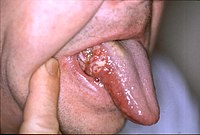
Photo from wikipedia
e18827 Background: FT associated with cancer care damages patients’ quality of life and increases symptom burden. Developing countries lack public insurance programs to protect the growing population of older adults… Click to show full abstract
e18827 Background: FT associated with cancer care damages patients’ quality of life and increases symptom burden. Developing countries lack public insurance programs to protect the growing population of older adults with cancer from catastrophic expenses. In this cross-sectional mixed methods study, we evaluated FT among a Mexican older adults with cancer and their relatives. Methods: We included patients age ≥65 with the 10 most common tumors in Mexico according to GLOBOCAN and within 3-24 months (mo) of diagnosis at two public hospitals in Mexico City, and their relatives. For the quantitative component, patients and relatives answered the CFPB Financial Well-Being Scale (range 0-100 points, lower scores represent worse financial well-being), the COST-FACIT cancer-related financial burden scale (range 0-44 points, scores < 26 represent FT), and a 3 mo self-reported expense diary. For the qualitative component, focused interviews were used to describe the individual experience of selected patients and their relatives. Results: 96 patients (mean age 72.1 years, SD 6.1; 59.4% male) were included for the quantitative component. The most common tumor types were prostate (33%), colon (14%), breast (14%), and lung (10%); 45% had stage IV disease; and a third had no healthcare coverage. Mean COST-FACIT score was 16.4 (95% CI 14.8-17.9), with 9% reporting no FT (score ≥26), 52% mild FT (14-25), 39% moderate FT (1-13), and 0% severe FT (0). Mean CFPB Financial Well-Being Scale score was 45.2 (95% CI 43.3-47.1); with 78% reporting poor financial well-being (score ≤50). Median expenses in the previous 3 mo were $3225 USD ($23-$55,000), of which most were associated with purchasing medications, including chemotherapy (median $735, $0-$13425). Average monthly patient income was only $123/mo ($0-$2000). Focused interviews were done for 25 patient-relative dyads. While most had no debt before cancer, a significant proportion of patients and their relatives (mainly their sons, daughters, or siblings) acquired multiple debts from banks, retail stores offering high-interest sub-prime credits, and/or relatives to pay for cancer-related costs . A common theme related to FT was the long interval (up to 1 year) between first symptoms and diagnosis, during which they paid for several private consultations and diagnostic tests. In many cases patients had to travel up to 180 miles to find cancer care. Conclusions: 91% of older Mexican adults with cancer had FT, compared to 18% reported by older patients with advanced cancer in the USA. Likewise, 78% had scores ≤50 in CFPB, in contrast with 24% in the US. Our results show high out-of-pocket expenses, limited healthcare coverage, and a deleterious effect of FT on the economic stability, productivity, and income of entire families and generations. Financial protection schemes are needed to protect older adults with cancer living in developing countries.
Journal Title: Journal of Clinical Oncology
Year Published: 2021
Link to full text (if available)
Share on Social Media: Sign Up to like & get
recommendations!